Business Research Report: Accounting Issues in Australian Agriculture
VerifiedAdded on 2019/10/30
|14
|2516
|82
Report
AI Summary
This business research report examines the accounting issues faced by rural and agricultural businesses in Australia. The research identifies key challenges, including difficulties with bookkeeping, lack of access to prompt financial resources, and the impact of intermediaries. The study utilizes a qualitative research approach, employing interviews with traders and intermediaries to gather data on their experiences and perspectives. The research design includes exploratory, explanatory, and descriptive methods to analyze the relationship between accounting practices and the performance of agricultural businesses. The report also explores the limitations of the study, such as the potential for varying interpretations and difficulties in data collection. Ultimately, the report aims to provide insights into how government measures and technological advancements could improve accounting performance and foster the development of the Australian agricultural sector. The report also highlights the importance of addressing the challenges associated with accounting practices to ensure the long-term success and economic development of the industry.
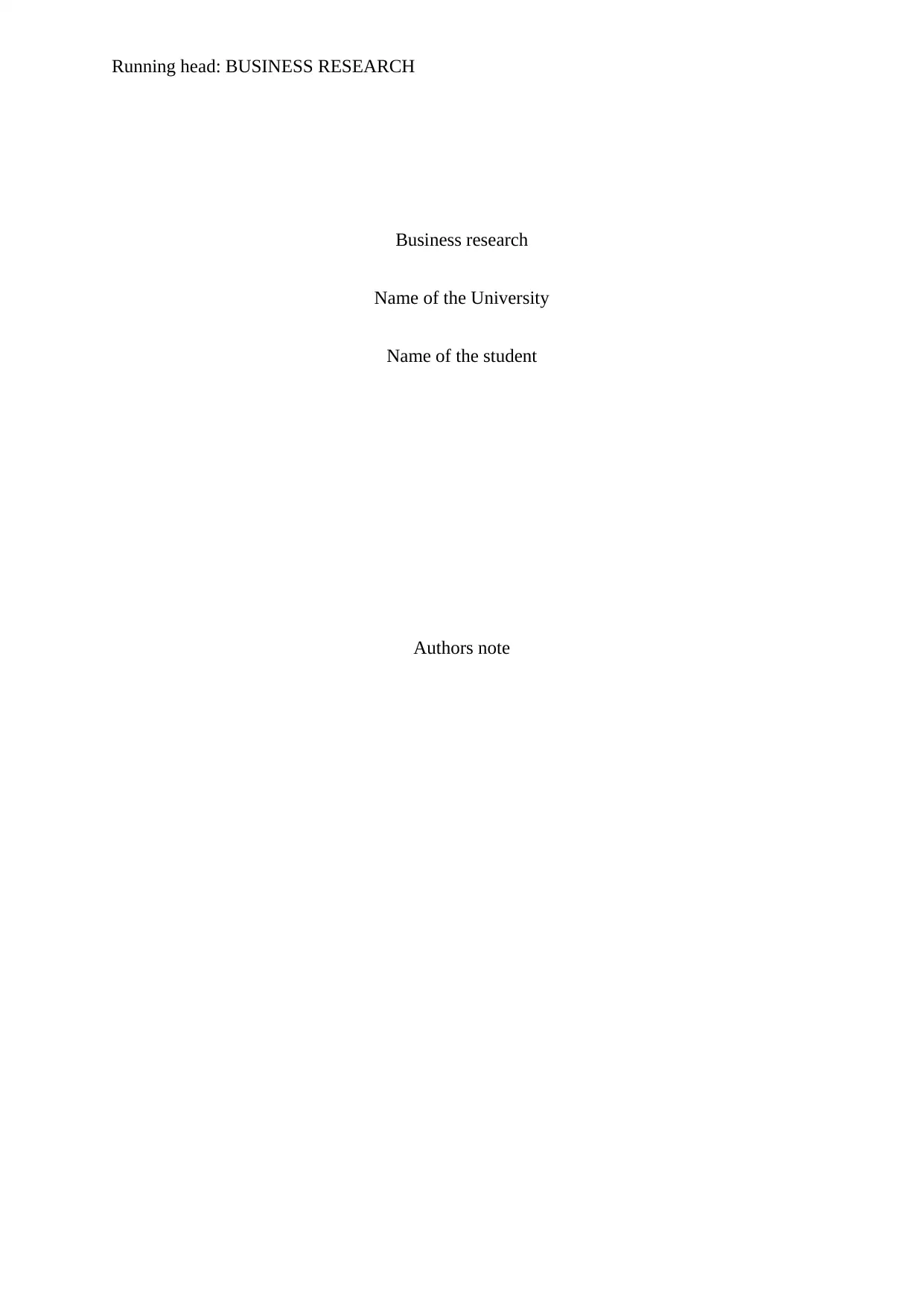
Running head: BUSINESS RESEARCH
Business research
Name of the University
Name of the student
Authors note
Business research
Name of the University
Name of the student
Authors note
Paraphrase This Document
Need a fresh take? Get an instant paraphrase of this document with our AI Paraphraser
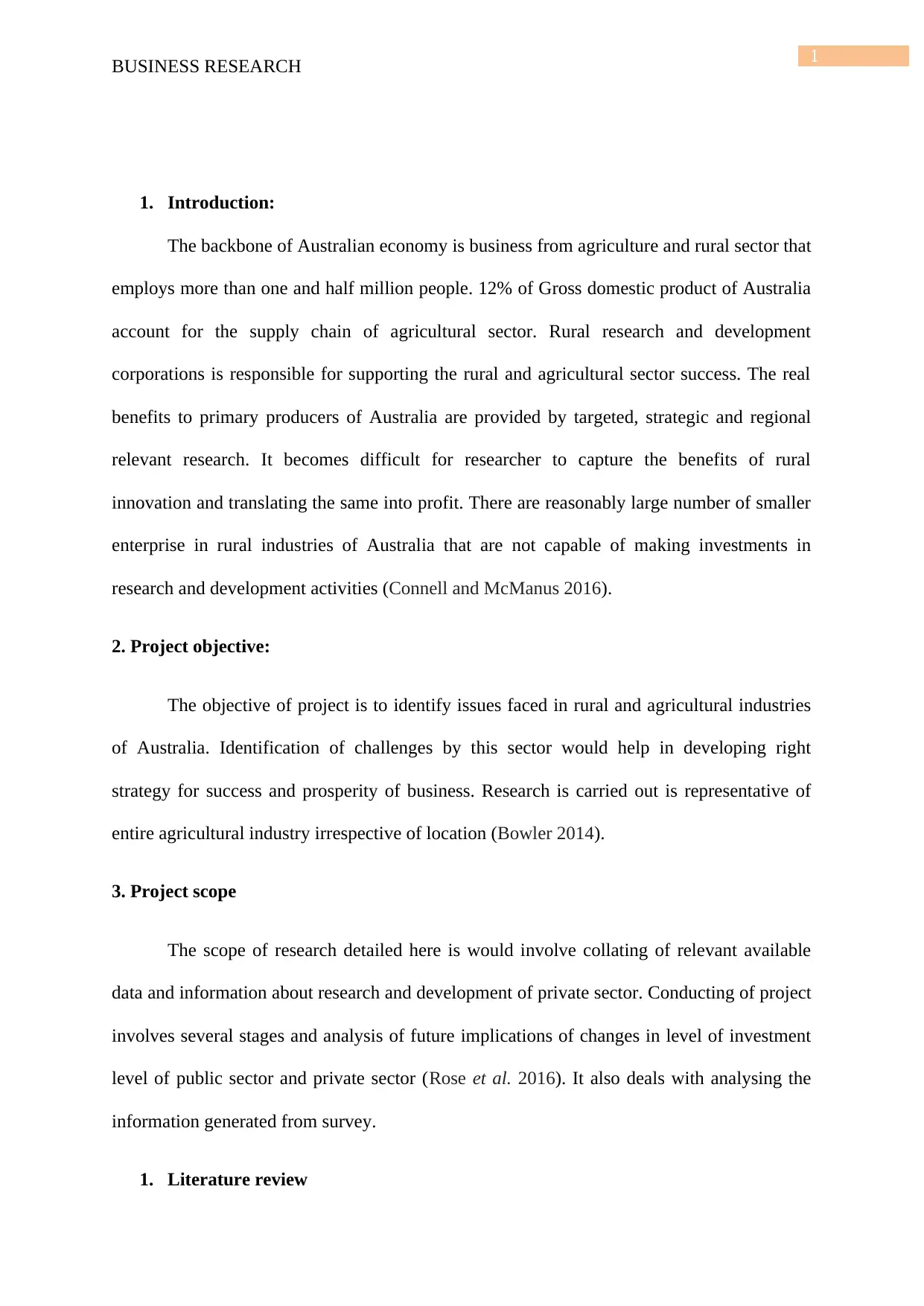
1
BUSINESS RESEARCH
1. Introduction:
The backbone of Australian economy is business from agriculture and rural sector that
employs more than one and half million people. 12% of Gross domestic product of Australia
account for the supply chain of agricultural sector. Rural research and development
corporations is responsible for supporting the rural and agricultural sector success. The real
benefits to primary producers of Australia are provided by targeted, strategic and regional
relevant research. It becomes difficult for researcher to capture the benefits of rural
innovation and translating the same into profit. There are reasonably large number of smaller
enterprise in rural industries of Australia that are not capable of making investments in
research and development activities (Connell and McManus 2016).
2. Project objective:
The objective of project is to identify issues faced in rural and agricultural industries
of Australia. Identification of challenges by this sector would help in developing right
strategy for success and prosperity of business. Research is carried out is representative of
entire agricultural industry irrespective of location (Bowler 2014).
3. Project scope
The scope of research detailed here is would involve collating of relevant available
data and information about research and development of private sector. Conducting of project
involves several stages and analysis of future implications of changes in level of investment
level of public sector and private sector (Rose et al. 2016). It also deals with analysing the
information generated from survey.
1. Literature review
BUSINESS RESEARCH
1. Introduction:
The backbone of Australian economy is business from agriculture and rural sector that
employs more than one and half million people. 12% of Gross domestic product of Australia
account for the supply chain of agricultural sector. Rural research and development
corporations is responsible for supporting the rural and agricultural sector success. The real
benefits to primary producers of Australia are provided by targeted, strategic and regional
relevant research. It becomes difficult for researcher to capture the benefits of rural
innovation and translating the same into profit. There are reasonably large number of smaller
enterprise in rural industries of Australia that are not capable of making investments in
research and development activities (Connell and McManus 2016).
2. Project objective:
The objective of project is to identify issues faced in rural and agricultural industries
of Australia. Identification of challenges by this sector would help in developing right
strategy for success and prosperity of business. Research is carried out is representative of
entire agricultural industry irrespective of location (Bowler 2014).
3. Project scope
The scope of research detailed here is would involve collating of relevant available
data and information about research and development of private sector. Conducting of project
involves several stages and analysis of future implications of changes in level of investment
level of public sector and private sector (Rose et al. 2016). It also deals with analysing the
information generated from survey.
1. Literature review
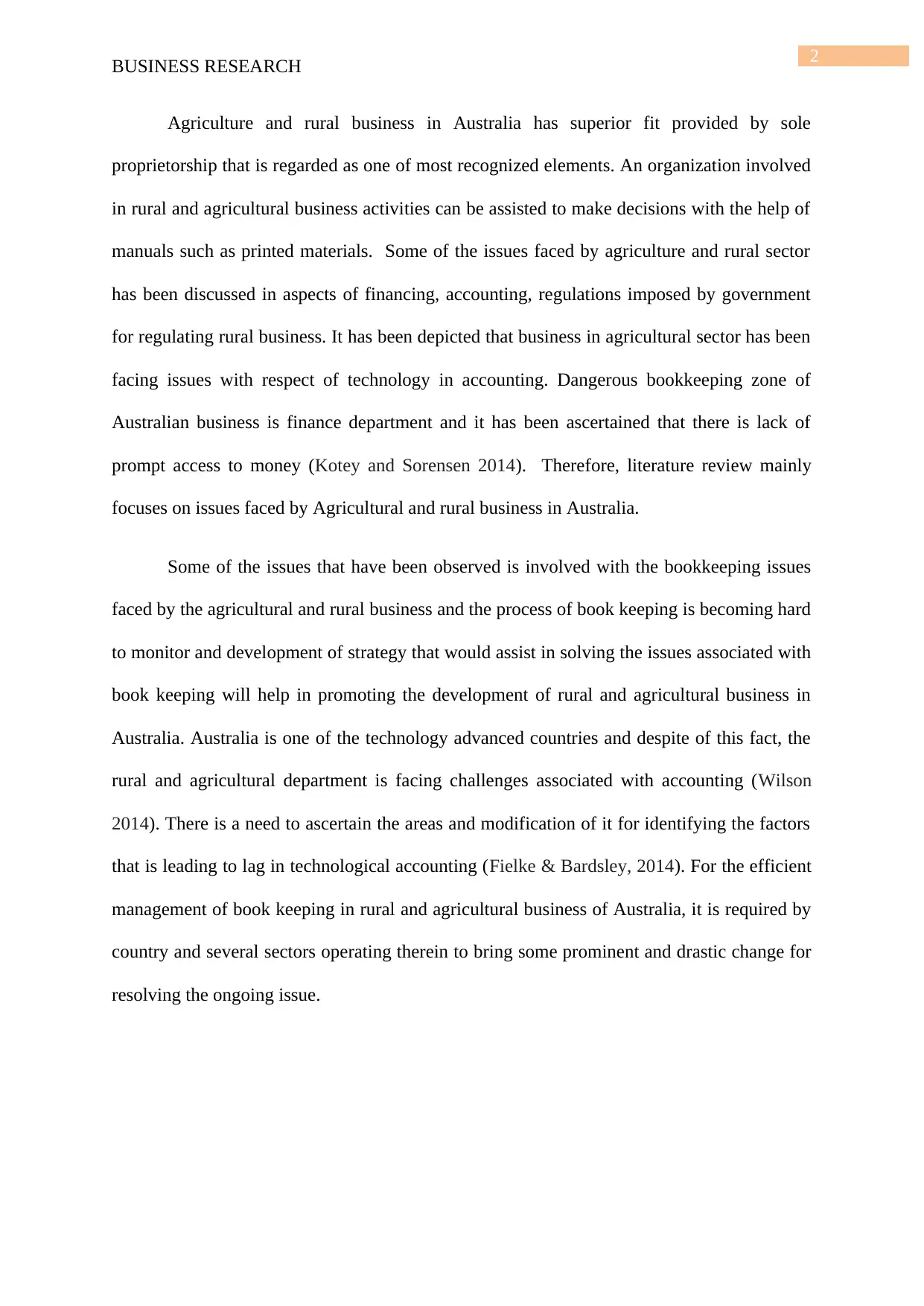
2
BUSINESS RESEARCH
Agriculture and rural business in Australia has superior fit provided by sole
proprietorship that is regarded as one of most recognized elements. An organization involved
in rural and agricultural business activities can be assisted to make decisions with the help of
manuals such as printed materials. Some of the issues faced by agriculture and rural sector
has been discussed in aspects of financing, accounting, regulations imposed by government
for regulating rural business. It has been depicted that business in agricultural sector has been
facing issues with respect of technology in accounting. Dangerous bookkeeping zone of
Australian business is finance department and it has been ascertained that there is lack of
prompt access to money (Kotey and Sorensen 2014). Therefore, literature review mainly
focuses on issues faced by Agricultural and rural business in Australia.
Some of the issues that have been observed is involved with the bookkeeping issues
faced by the agricultural and rural business and the process of book keeping is becoming hard
to monitor and development of strategy that would assist in solving the issues associated with
book keeping will help in promoting the development of rural and agricultural business in
Australia. Australia is one of the technology advanced countries and despite of this fact, the
rural and agricultural department is facing challenges associated with accounting (Wilson
2014). There is a need to ascertain the areas and modification of it for identifying the factors
that is leading to lag in technological accounting (Fielke & Bardsley, 2014). For the efficient
management of book keeping in rural and agricultural business of Australia, it is required by
country and several sectors operating therein to bring some prominent and drastic change for
resolving the ongoing issue.
BUSINESS RESEARCH
Agriculture and rural business in Australia has superior fit provided by sole
proprietorship that is regarded as one of most recognized elements. An organization involved
in rural and agricultural business activities can be assisted to make decisions with the help of
manuals such as printed materials. Some of the issues faced by agriculture and rural sector
has been discussed in aspects of financing, accounting, regulations imposed by government
for regulating rural business. It has been depicted that business in agricultural sector has been
facing issues with respect of technology in accounting. Dangerous bookkeeping zone of
Australian business is finance department and it has been ascertained that there is lack of
prompt access to money (Kotey and Sorensen 2014). Therefore, literature review mainly
focuses on issues faced by Agricultural and rural business in Australia.
Some of the issues that have been observed is involved with the bookkeeping issues
faced by the agricultural and rural business and the process of book keeping is becoming hard
to monitor and development of strategy that would assist in solving the issues associated with
book keeping will help in promoting the development of rural and agricultural business in
Australia. Australia is one of the technology advanced countries and despite of this fact, the
rural and agricultural department is facing challenges associated with accounting (Wilson
2014). There is a need to ascertain the areas and modification of it for identifying the factors
that is leading to lag in technological accounting (Fielke & Bardsley, 2014). For the efficient
management of book keeping in rural and agricultural business of Australia, it is required by
country and several sectors operating therein to bring some prominent and drastic change for
resolving the ongoing issue.
⊘ This is a preview!⊘
Do you want full access?
Subscribe today to unlock all pages.

Trusted by 1+ million students worldwide
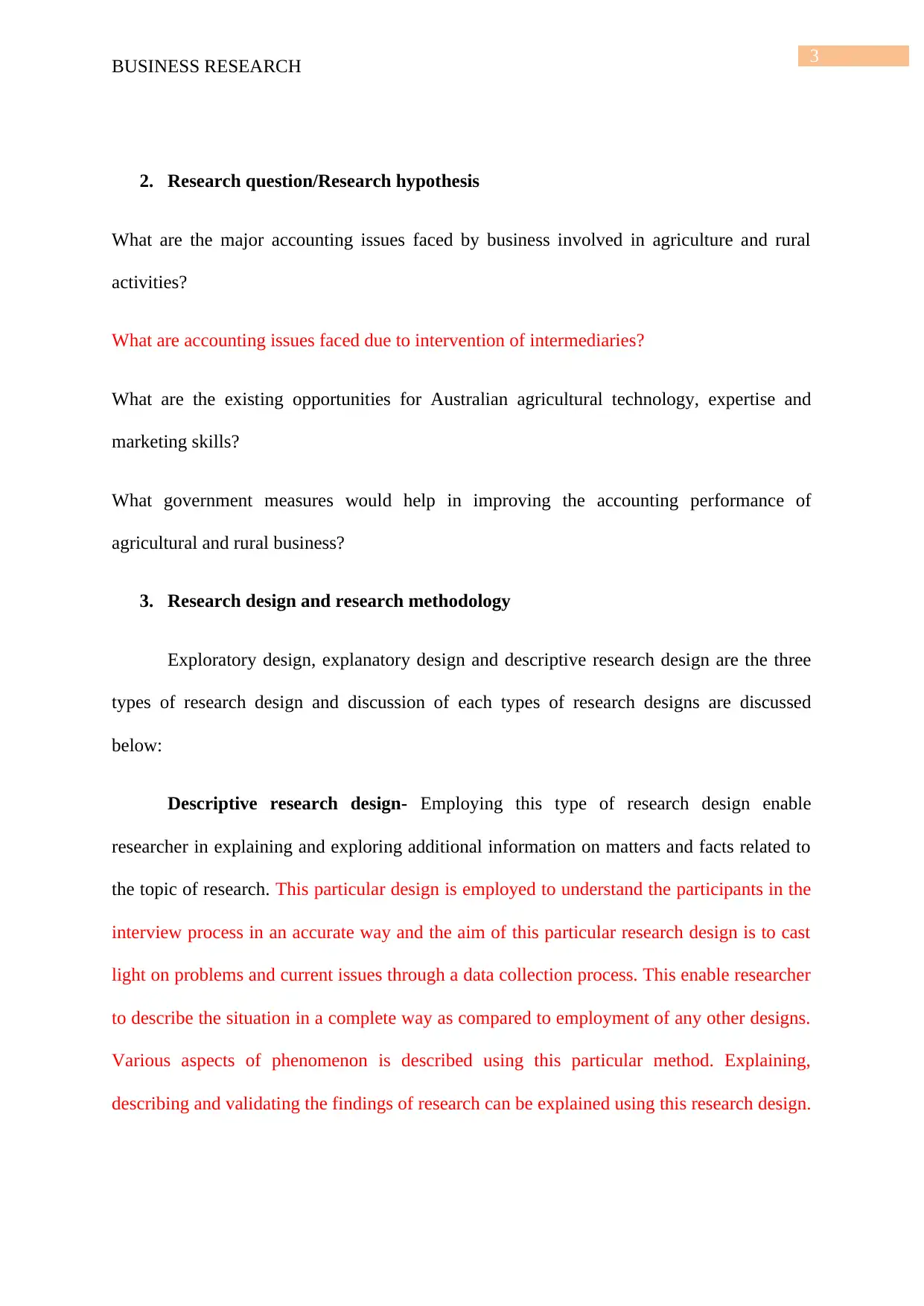
3
BUSINESS RESEARCH
2. Research question/Research hypothesis
What are the major accounting issues faced by business involved in agriculture and rural
activities?
What are accounting issues faced due to intervention of intermediaries?
What are the existing opportunities for Australian agricultural technology, expertise and
marketing skills?
What government measures would help in improving the accounting performance of
agricultural and rural business?
3. Research design and research methodology
Exploratory design, explanatory design and descriptive research design are the three
types of research design and discussion of each types of research designs are discussed
below:
Descriptive research design- Employing this type of research design enable
researcher in explaining and exploring additional information on matters and facts related to
the topic of research. This particular design is employed to understand the participants in the
interview process in an accurate way and the aim of this particular research design is to cast
light on problems and current issues through a data collection process. This enable researcher
to describe the situation in a complete way as compared to employment of any other designs.
Various aspects of phenomenon is described using this particular method. Explaining,
describing and validating the findings of research can be explained using this research design.
BUSINESS RESEARCH
2. Research question/Research hypothesis
What are the major accounting issues faced by business involved in agriculture and rural
activities?
What are accounting issues faced due to intervention of intermediaries?
What are the existing opportunities for Australian agricultural technology, expertise and
marketing skills?
What government measures would help in improving the accounting performance of
agricultural and rural business?
3. Research design and research methodology
Exploratory design, explanatory design and descriptive research design are the three
types of research design and discussion of each types of research designs are discussed
below:
Descriptive research design- Employing this type of research design enable
researcher in explaining and exploring additional information on matters and facts related to
the topic of research. This particular design is employed to understand the participants in the
interview process in an accurate way and the aim of this particular research design is to cast
light on problems and current issues through a data collection process. This enable researcher
to describe the situation in a complete way as compared to employment of any other designs.
Various aspects of phenomenon is described using this particular method. Explaining,
describing and validating the findings of research can be explained using this research design.
Paraphrase This Document
Need a fresh take? Get an instant paraphrase of this document with our AI Paraphraser
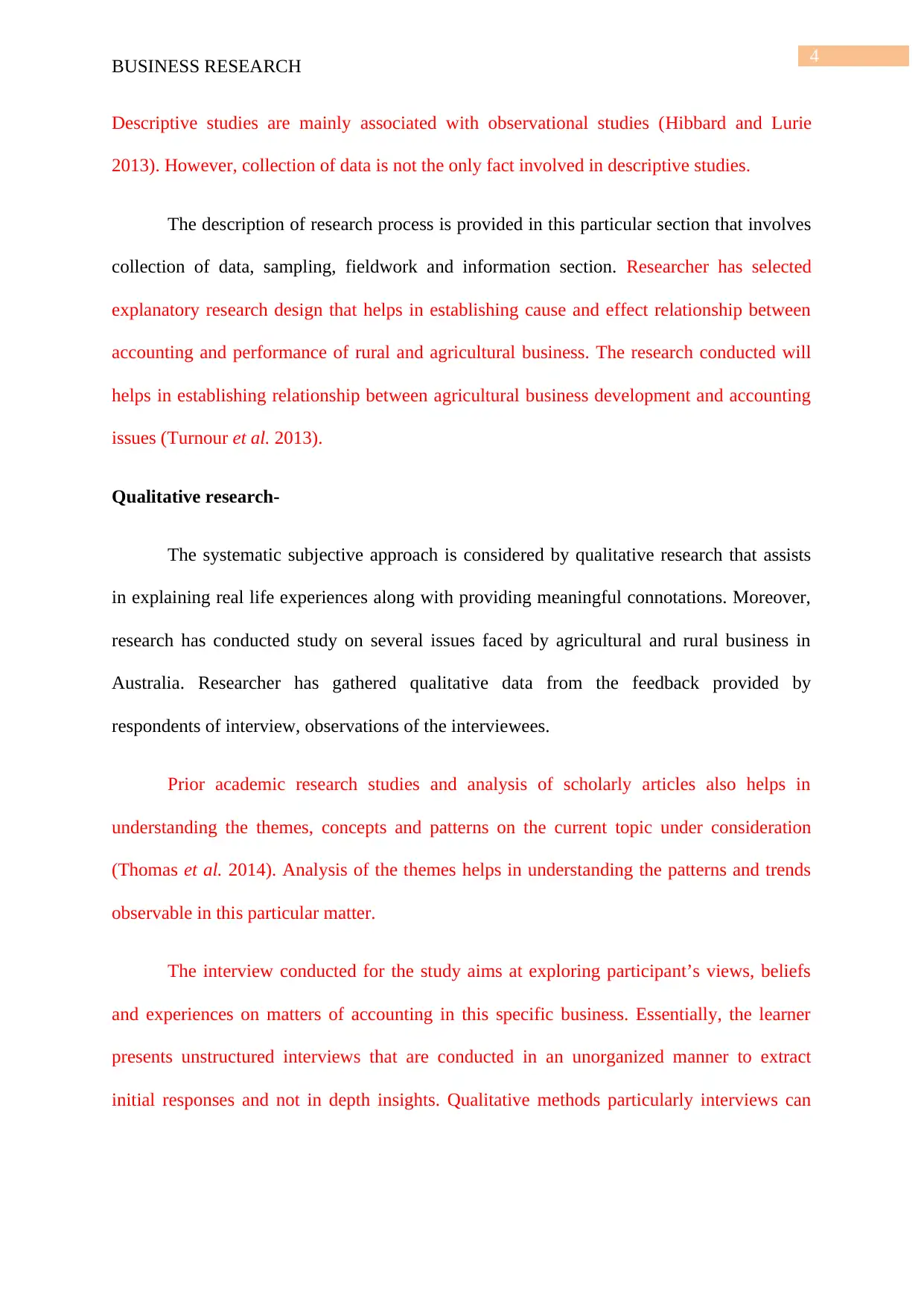
4
BUSINESS RESEARCH
Descriptive studies are mainly associated with observational studies (Hibbard and Lurie
2013). However, collection of data is not the only fact involved in descriptive studies.
The description of research process is provided in this particular section that involves
collection of data, sampling, fieldwork and information section. Researcher has selected
explanatory research design that helps in establishing cause and effect relationship between
accounting and performance of rural and agricultural business. The research conducted will
helps in establishing relationship between agricultural business development and accounting
issues (Turnour et al. 2013).
Qualitative research-
The systematic subjective approach is considered by qualitative research that assists
in explaining real life experiences along with providing meaningful connotations. Moreover,
research has conducted study on several issues faced by agricultural and rural business in
Australia. Researcher has gathered qualitative data from the feedback provided by
respondents of interview, observations of the interviewees.
Prior academic research studies and analysis of scholarly articles also helps in
understanding the themes, concepts and patterns on the current topic under consideration
(Thomas et al. 2014). Analysis of the themes helps in understanding the patterns and trends
observable in this particular matter.
The interview conducted for the study aims at exploring participant’s views, beliefs
and experiences on matters of accounting in this specific business. Essentially, the learner
presents unstructured interviews that are conducted in an unorganized manner to extract
initial responses and not in depth insights. Qualitative methods particularly interviews can
BUSINESS RESEARCH
Descriptive studies are mainly associated with observational studies (Hibbard and Lurie
2013). However, collection of data is not the only fact involved in descriptive studies.
The description of research process is provided in this particular section that involves
collection of data, sampling, fieldwork and information section. Researcher has selected
explanatory research design that helps in establishing cause and effect relationship between
accounting and performance of rural and agricultural business. The research conducted will
helps in establishing relationship between agricultural business development and accounting
issues (Turnour et al. 2013).
Qualitative research-
The systematic subjective approach is considered by qualitative research that assists
in explaining real life experiences along with providing meaningful connotations. Moreover,
research has conducted study on several issues faced by agricultural and rural business in
Australia. Researcher has gathered qualitative data from the feedback provided by
respondents of interview, observations of the interviewees.
Prior academic research studies and analysis of scholarly articles also helps in
understanding the themes, concepts and patterns on the current topic under consideration
(Thomas et al. 2014). Analysis of the themes helps in understanding the patterns and trends
observable in this particular matter.
The interview conducted for the study aims at exploring participant’s views, beliefs
and experiences on matters of accounting in this specific business. Essentially, the learner
presents unstructured interviews that are conducted in an unorganized manner to extract
initial responses and not in depth insights. Qualitative methods particularly interviews can
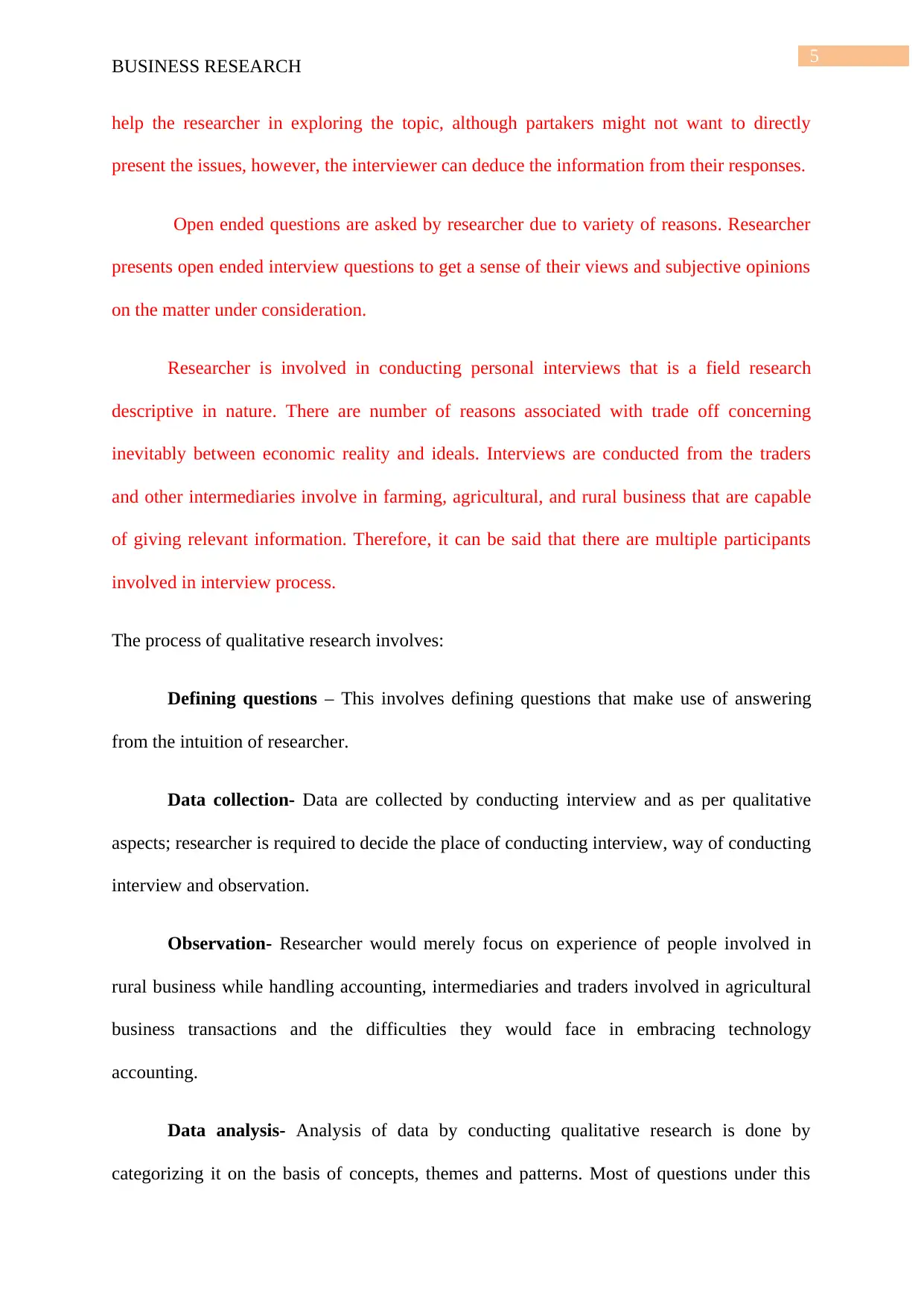
5
BUSINESS RESEARCH
help the researcher in exploring the topic, although partakers might not want to directly
present the issues, however, the interviewer can deduce the information from their responses.
Open ended questions are asked by researcher due to variety of reasons. Researcher
presents open ended interview questions to get a sense of their views and subjective opinions
on the matter under consideration.
Researcher is involved in conducting personal interviews that is a field research
descriptive in nature. There are number of reasons associated with trade off concerning
inevitably between economic reality and ideals. Interviews are conducted from the traders
and other intermediaries involve in farming, agricultural, and rural business that are capable
of giving relevant information. Therefore, it can be said that there are multiple participants
involved in interview process.
The process of qualitative research involves:
Defining questions – This involves defining questions that make use of answering
from the intuition of researcher.
Data collection- Data are collected by conducting interview and as per qualitative
aspects; researcher is required to decide the place of conducting interview, way of conducting
interview and observation.
Observation- Researcher would merely focus on experience of people involved in
rural business while handling accounting, intermediaries and traders involved in agricultural
business transactions and the difficulties they would face in embracing technology
accounting.
Data analysis- Analysis of data by conducting qualitative research is done by
categorizing it on the basis of concepts, themes and patterns. Most of questions under this
BUSINESS RESEARCH
help the researcher in exploring the topic, although partakers might not want to directly
present the issues, however, the interviewer can deduce the information from their responses.
Open ended questions are asked by researcher due to variety of reasons. Researcher
presents open ended interview questions to get a sense of their views and subjective opinions
on the matter under consideration.
Researcher is involved in conducting personal interviews that is a field research
descriptive in nature. There are number of reasons associated with trade off concerning
inevitably between economic reality and ideals. Interviews are conducted from the traders
and other intermediaries involve in farming, agricultural, and rural business that are capable
of giving relevant information. Therefore, it can be said that there are multiple participants
involved in interview process.
The process of qualitative research involves:
Defining questions – This involves defining questions that make use of answering
from the intuition of researcher.
Data collection- Data are collected by conducting interview and as per qualitative
aspects; researcher is required to decide the place of conducting interview, way of conducting
interview and observation.
Observation- Researcher would merely focus on experience of people involved in
rural business while handling accounting, intermediaries and traders involved in agricultural
business transactions and the difficulties they would face in embracing technology
accounting.
Data analysis- Analysis of data by conducting qualitative research is done by
categorizing it on the basis of concepts, themes and patterns. Most of questions under this
⊘ This is a preview!⊘
Do you want full access?
Subscribe today to unlock all pages.

Trusted by 1+ million students worldwide
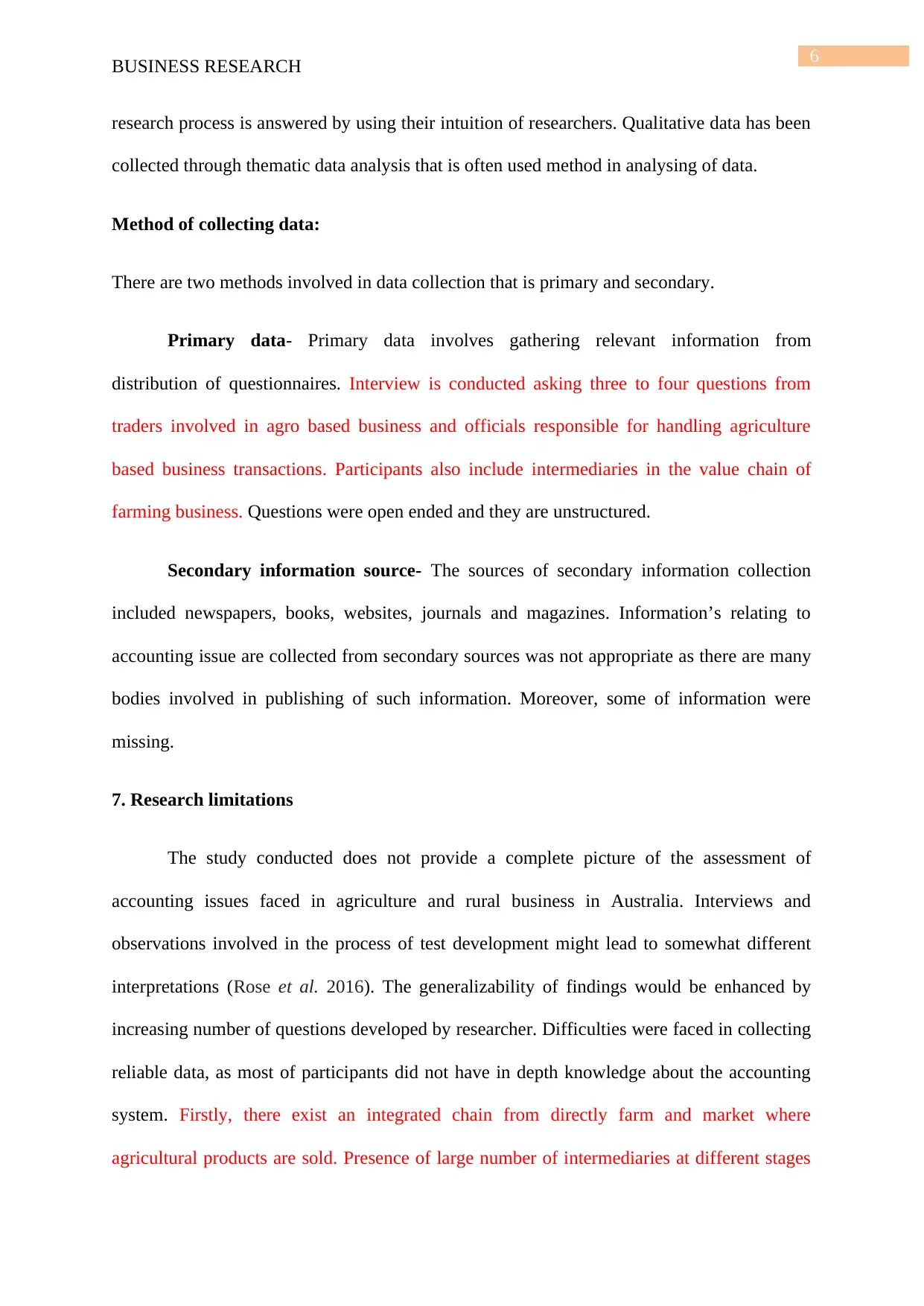
6
BUSINESS RESEARCH
research process is answered by using their intuition of researchers. Qualitative data has been
collected through thematic data analysis that is often used method in analysing of data.
Method of collecting data:
There are two methods involved in data collection that is primary and secondary.
Primary data- Primary data involves gathering relevant information from
distribution of questionnaires. Interview is conducted asking three to four questions from
traders involved in agro based business and officials responsible for handling agriculture
based business transactions. Participants also include intermediaries in the value chain of
farming business. Questions were open ended and they are unstructured.
Secondary information source- The sources of secondary information collection
included newspapers, books, websites, journals and magazines. Information’s relating to
accounting issue are collected from secondary sources was not appropriate as there are many
bodies involved in publishing of such information. Moreover, some of information were
missing.
7. Research limitations
The study conducted does not provide a complete picture of the assessment of
accounting issues faced in agriculture and rural business in Australia. Interviews and
observations involved in the process of test development might lead to somewhat different
interpretations (Rose et al. 2016). The generalizability of findings would be enhanced by
increasing number of questions developed by researcher. Difficulties were faced in collecting
reliable data, as most of participants did not have in depth knowledge about the accounting
system. Firstly, there exist an integrated chain from directly farm and market where
agricultural products are sold. Presence of large number of intermediaries at different stages
BUSINESS RESEARCH
research process is answered by using their intuition of researchers. Qualitative data has been
collected through thematic data analysis that is often used method in analysing of data.
Method of collecting data:
There are two methods involved in data collection that is primary and secondary.
Primary data- Primary data involves gathering relevant information from
distribution of questionnaires. Interview is conducted asking three to four questions from
traders involved in agro based business and officials responsible for handling agriculture
based business transactions. Participants also include intermediaries in the value chain of
farming business. Questions were open ended and they are unstructured.
Secondary information source- The sources of secondary information collection
included newspapers, books, websites, journals and magazines. Information’s relating to
accounting issue are collected from secondary sources was not appropriate as there are many
bodies involved in publishing of such information. Moreover, some of information were
missing.
7. Research limitations
The study conducted does not provide a complete picture of the assessment of
accounting issues faced in agriculture and rural business in Australia. Interviews and
observations involved in the process of test development might lead to somewhat different
interpretations (Rose et al. 2016). The generalizability of findings would be enhanced by
increasing number of questions developed by researcher. Difficulties were faced in collecting
reliable data, as most of participants did not have in depth knowledge about the accounting
system. Firstly, there exist an integrated chain from directly farm and market where
agricultural products are sold. Presence of large number of intermediaries at different stages
Paraphrase This Document
Need a fresh take? Get an instant paraphrase of this document with our AI Paraphraser
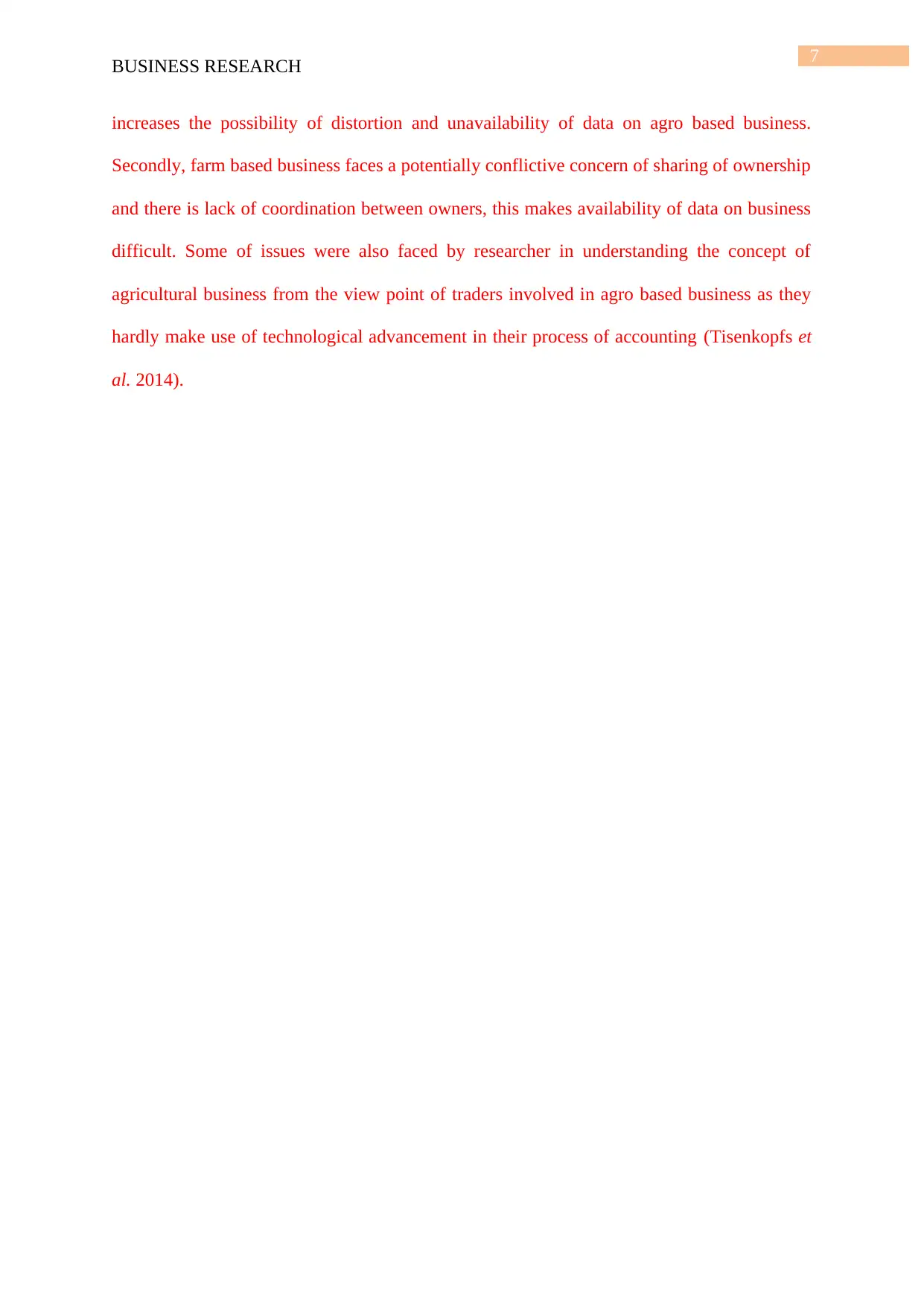
7
BUSINESS RESEARCH
increases the possibility of distortion and unavailability of data on agro based business.
Secondly, farm based business faces a potentially conflictive concern of sharing of ownership
and there is lack of coordination between owners, this makes availability of data on business
difficult. Some of issues were also faced by researcher in understanding the concept of
agricultural business from the view point of traders involved in agro based business as they
hardly make use of technological advancement in their process of accounting (Tisenkopfs et
al. 2014).
BUSINESS RESEARCH
increases the possibility of distortion and unavailability of data on agro based business.
Secondly, farm based business faces a potentially conflictive concern of sharing of ownership
and there is lack of coordination between owners, this makes availability of data on business
difficult. Some of issues were also faced by researcher in understanding the concept of
agricultural business from the view point of traders involved in agro based business as they
hardly make use of technological advancement in their process of accounting (Tisenkopfs et
al. 2014).
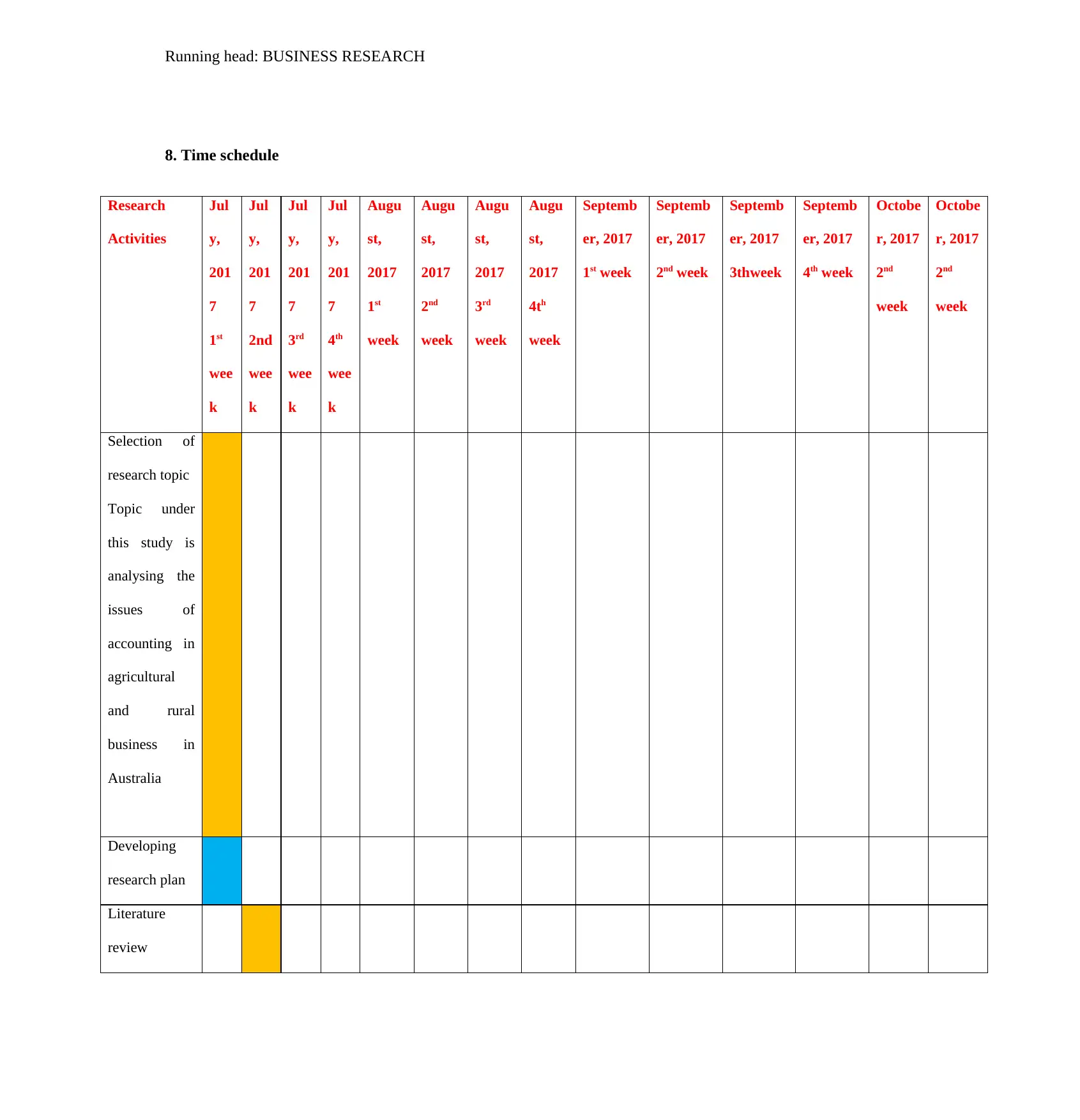
Running head: BUSINESS RESEARCH
8. Time schedule
Research
Activities
Jul
y,
201
7
1st
wee
k
Jul
y,
201
7
2nd
wee
k
Jul
y,
201
7
3rd
wee
k
Jul
y,
201
7
4th
wee
k
Augu
st,
2017
1st
week
Augu
st,
2017
2nd
week
Augu
st,
2017
3rd
week
Augu
st,
2017
4th
week
Septemb
er, 2017
1st week
Septemb
er, 2017
2nd week
Septemb
er, 2017
3thweek
Septemb
er, 2017
4th week
Octobe
r, 2017
2nd
week
Octobe
r, 2017
2nd
week
Selection of
research topic
Topic under
this study is
analysing the
issues of
accounting in
agricultural
and rural
business in
Australia
Developing
research plan
Literature
review
8. Time schedule
Research
Activities
Jul
y,
201
7
1st
wee
k
Jul
y,
201
7
2nd
wee
k
Jul
y,
201
7
3rd
wee
k
Jul
y,
201
7
4th
wee
k
Augu
st,
2017
1st
week
Augu
st,
2017
2nd
week
Augu
st,
2017
3rd
week
Augu
st,
2017
4th
week
Septemb
er, 2017
1st week
Septemb
er, 2017
2nd week
Septemb
er, 2017
3thweek
Septemb
er, 2017
4th week
Octobe
r, 2017
2nd
week
Octobe
r, 2017
2nd
week
Selection of
research topic
Topic under
this study is
analysing the
issues of
accounting in
agricultural
and rural
business in
Australia
Developing
research plan
Literature
review
⊘ This is a preview!⊘
Do you want full access?
Subscribe today to unlock all pages.

Trusted by 1+ million students worldwide
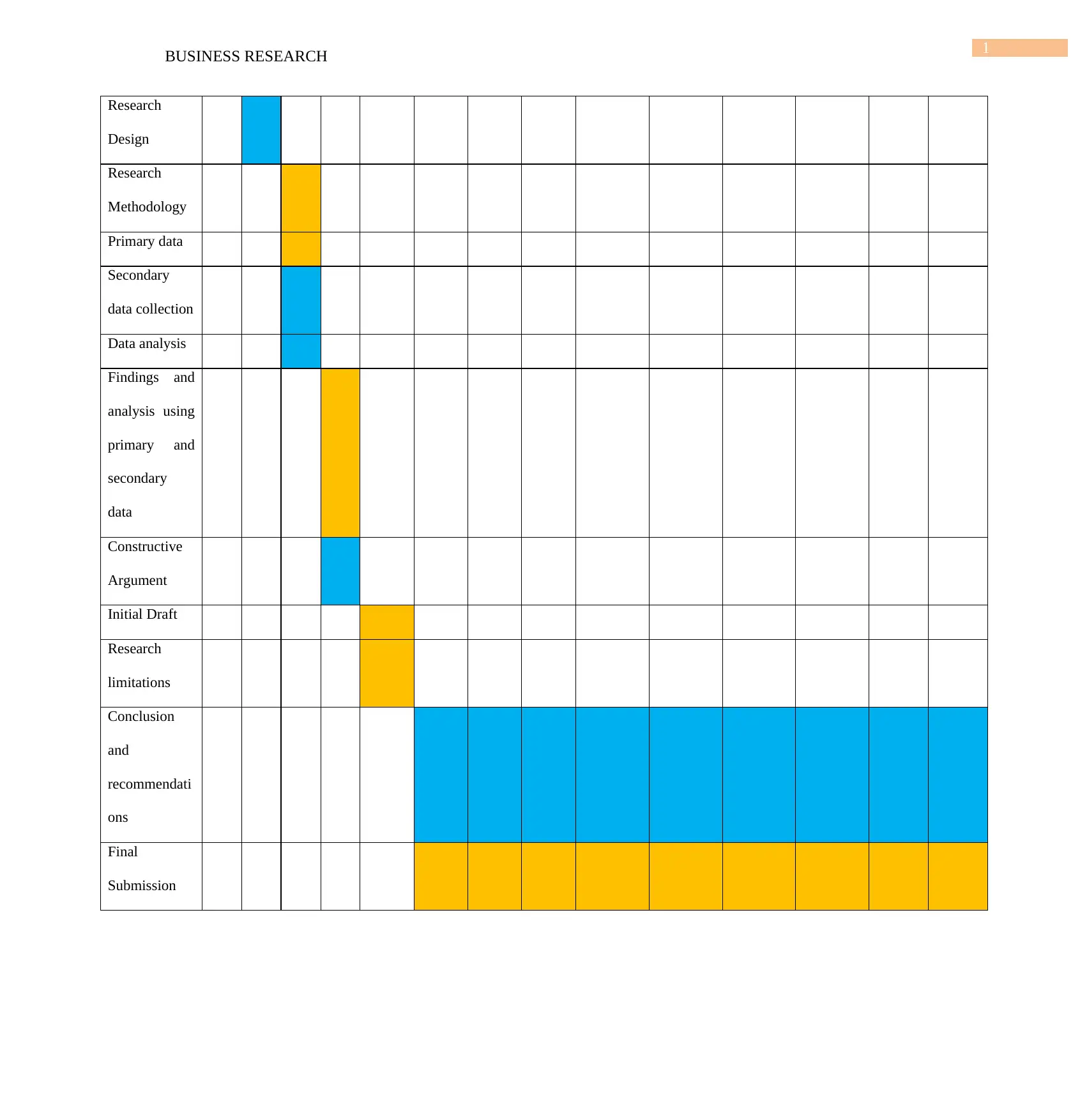
1
BUSINESS RESEARCH
Research
Design
Research
Methodology
Primary data
Secondary
data collection
Data analysis
Findings and
analysis using
primary and
secondary
data
Constructive
Argument
Initial Draft
Research
limitations
Conclusion
and
recommendati
ons
Final
Submission
BUSINESS RESEARCH
Research
Design
Research
Methodology
Primary data
Secondary
data collection
Data analysis
Findings and
analysis using
primary and
secondary
data
Constructive
Argument
Initial Draft
Research
limitations
Conclusion
and
recommendati
ons
Final
Submission
Paraphrase This Document
Need a fresh take? Get an instant paraphrase of this document with our AI Paraphraser
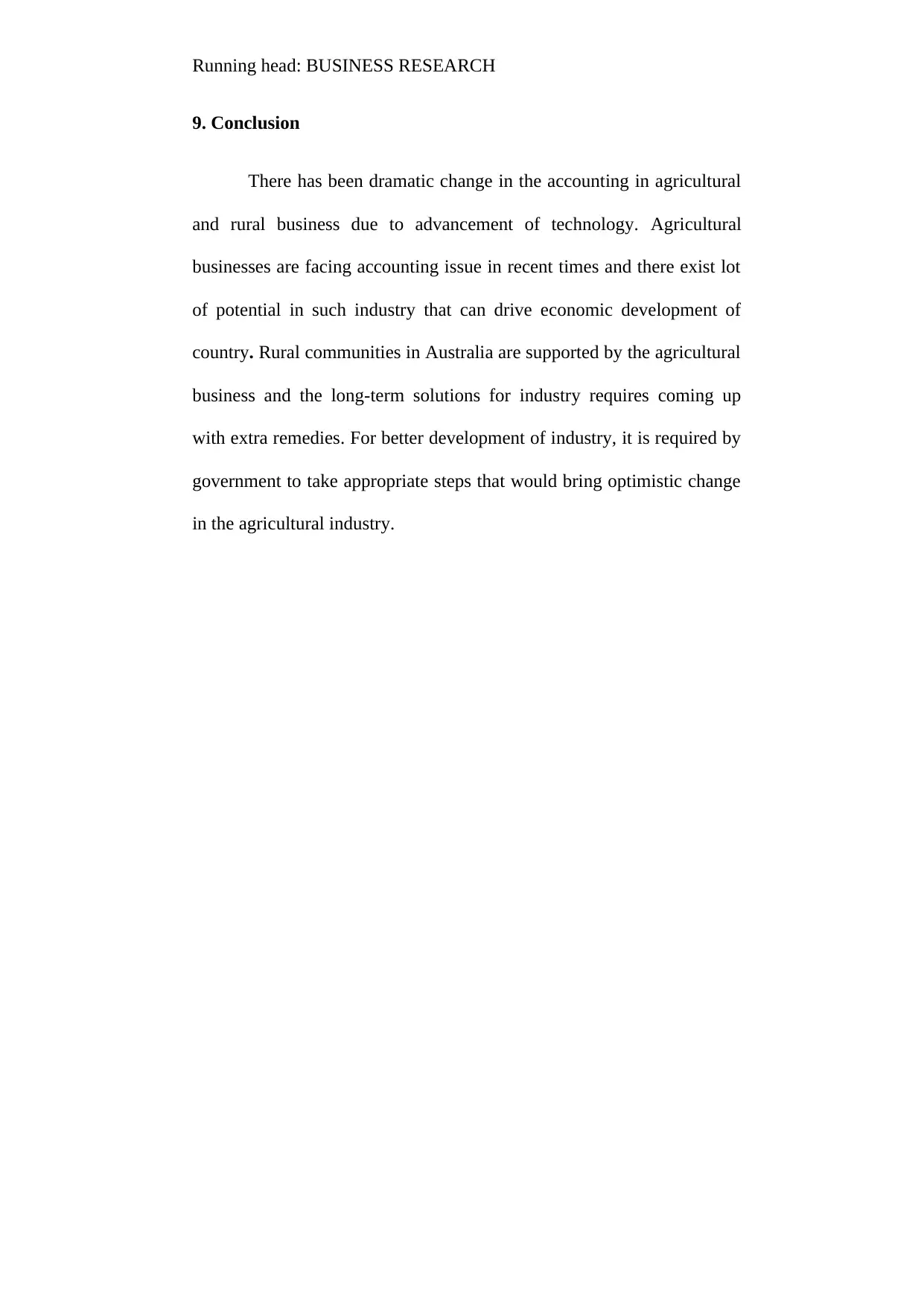
Running head: BUSINESS RESEARCH
9. Conclusion
There has been dramatic change in the accounting in agricultural
and rural business due to advancement of technology. Agricultural
businesses are facing accounting issue in recent times and there exist lot
of potential in such industry that can drive economic development of
country. Rural communities in Australia are supported by the agricultural
business and the long-term solutions for industry requires coming up
with extra remedies. For better development of industry, it is required by
government to take appropriate steps that would bring optimistic change
in the agricultural industry.
9. Conclusion
There has been dramatic change in the accounting in agricultural
and rural business due to advancement of technology. Agricultural
businesses are facing accounting issue in recent times and there exist lot
of potential in such industry that can drive economic development of
country. Rural communities in Australia are supported by the agricultural
business and the long-term solutions for industry requires coming up
with extra remedies. For better development of industry, it is required by
government to take appropriate steps that would bring optimistic change
in the agricultural industry.
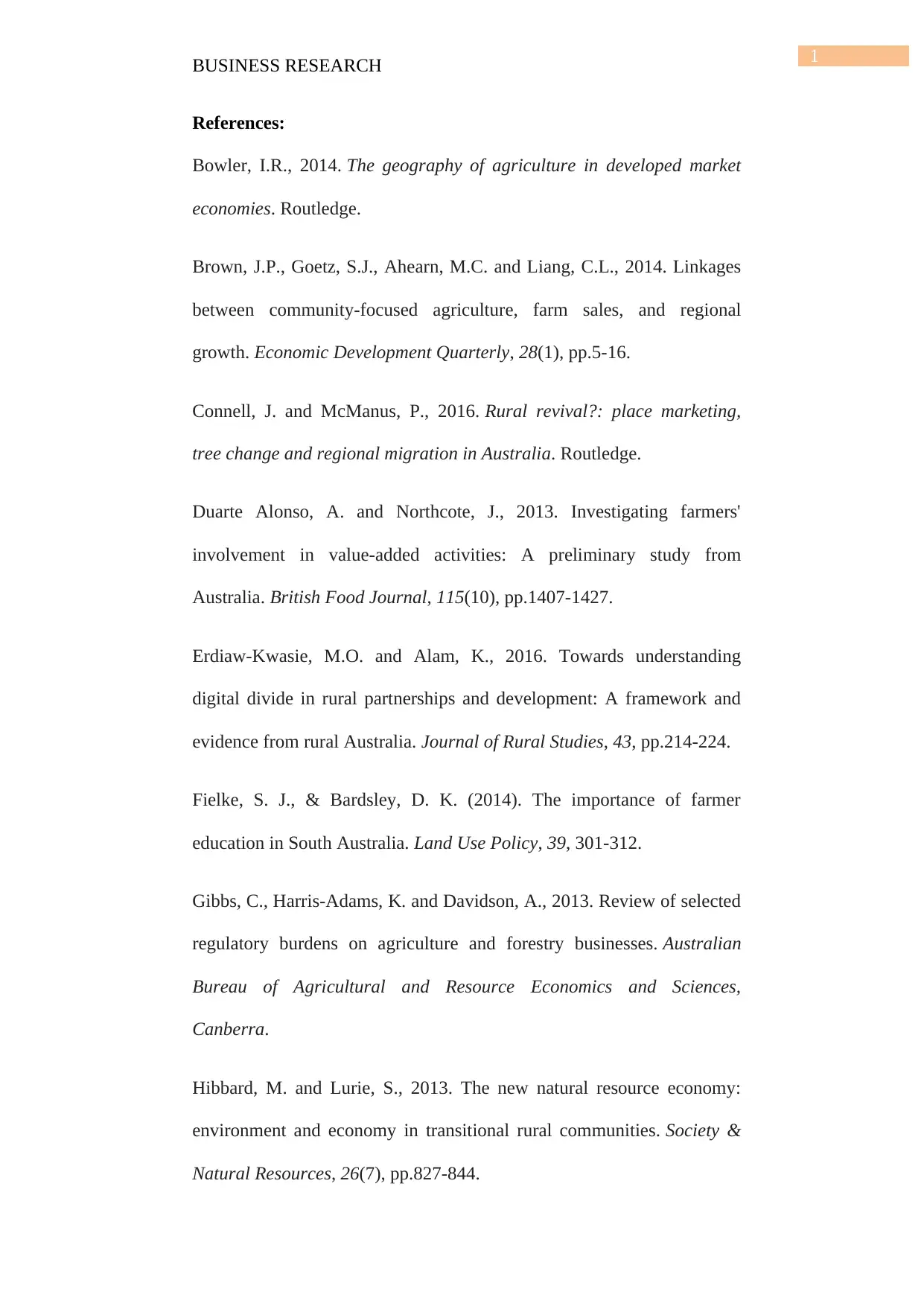
1
BUSINESS RESEARCH
References:
Bowler, I.R., 2014. The geography of agriculture in developed market
economies. Routledge.
Brown, J.P., Goetz, S.J., Ahearn, M.C. and Liang, C.L., 2014. Linkages
between community-focused agriculture, farm sales, and regional
growth. Economic Development Quarterly, 28(1), pp.5-16.
Connell, J. and McManus, P., 2016. Rural revival?: place marketing,
tree change and regional migration in Australia. Routledge.
Duarte Alonso, A. and Northcote, J., 2013. Investigating farmers'
involvement in value-added activities: A preliminary study from
Australia. British Food Journal, 115(10), pp.1407-1427.
Erdiaw-Kwasie, M.O. and Alam, K., 2016. Towards understanding
digital divide in rural partnerships and development: A framework and
evidence from rural Australia. Journal of Rural Studies, 43, pp.214-224.
Fielke, S. J., & Bardsley, D. K. (2014). The importance of farmer
education in South Australia. Land Use Policy, 39, 301-312.
Gibbs, C., Harris-Adams, K. and Davidson, A., 2013. Review of selected
regulatory burdens on agriculture and forestry businesses. Australian
Bureau of Agricultural and Resource Economics and Sciences,
Canberra.
Hibbard, M. and Lurie, S., 2013. The new natural resource economy:
environment and economy in transitional rural communities. Society &
Natural Resources, 26(7), pp.827-844.
BUSINESS RESEARCH
References:
Bowler, I.R., 2014. The geography of agriculture in developed market
economies. Routledge.
Brown, J.P., Goetz, S.J., Ahearn, M.C. and Liang, C.L., 2014. Linkages
between community-focused agriculture, farm sales, and regional
growth. Economic Development Quarterly, 28(1), pp.5-16.
Connell, J. and McManus, P., 2016. Rural revival?: place marketing,
tree change and regional migration in Australia. Routledge.
Duarte Alonso, A. and Northcote, J., 2013. Investigating farmers'
involvement in value-added activities: A preliminary study from
Australia. British Food Journal, 115(10), pp.1407-1427.
Erdiaw-Kwasie, M.O. and Alam, K., 2016. Towards understanding
digital divide in rural partnerships and development: A framework and
evidence from rural Australia. Journal of Rural Studies, 43, pp.214-224.
Fielke, S. J., & Bardsley, D. K. (2014). The importance of farmer
education in South Australia. Land Use Policy, 39, 301-312.
Gibbs, C., Harris-Adams, K. and Davidson, A., 2013. Review of selected
regulatory burdens on agriculture and forestry businesses. Australian
Bureau of Agricultural and Resource Economics and Sciences,
Canberra.
Hibbard, M. and Lurie, S., 2013. The new natural resource economy:
environment and economy in transitional rural communities. Society &
Natural Resources, 26(7), pp.827-844.
⊘ This is a preview!⊘
Do you want full access?
Subscribe today to unlock all pages.

Trusted by 1+ million students worldwide
1 out of 14
Related Documents
Your All-in-One AI-Powered Toolkit for Academic Success.
+13062052269
info@desklib.com
Available 24*7 on WhatsApp / Email
![[object Object]](/_next/static/media/star-bottom.7253800d.svg)
Unlock your academic potential
Copyright © 2020–2025 A2Z Services. All Rights Reserved. Developed and managed by ZUCOL.





